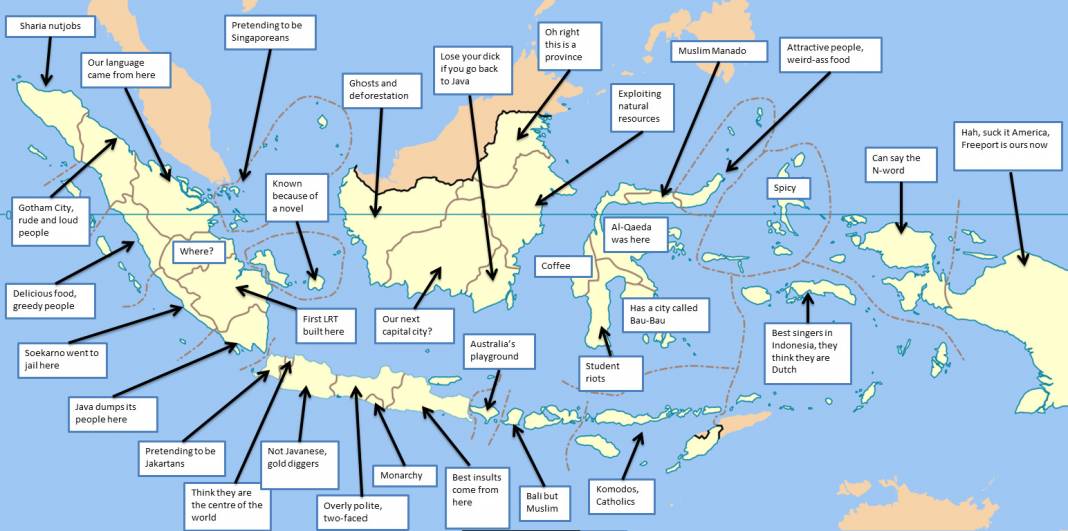The Importance of Mutual Understanding and Shifting Self-Perception
How do you feel when someone slates a lousy stereotype to your place of origin? Most of us would be very annoyed, right? So am I. Stereotypes are generalisations about a group of people, where certain characteristics are given to all members of the group, regardless of the variations that exist in its members. Indonesia, by any means, has some harmful stereotypes for their ethnic counterparts.
The story popped up when I came to Jakarta in the edge of 2017 for the pre-departure of my scholarship. Instead of being blithesome because I could land my feet to the capital city of Indonesia for the second time, my mood suddenly changed when hearing a friend of mine pointing out my ethnic as a ‘stingy’ society.
As a man who grew up and raised in Padang, I must question the prejudice over a ‘stingy’ word because it annoys me.
Truth be told, it’s not the Padang people or Minangnese who are stingy, but it’s the way how to survive in other places seeing the allowance given by parents is only a low amount of money.
Therefore, to see how things go, many of them were trying to be economical. In some extent, people think that the word ‘economical’ as being synonymous with ‘stingy’, and this perception sticks to our society along with the spreading rumours. At present, when strangers see somebody from the land of Minang, the prejudice of ‘stingy’ comes straight away.
Frankly speaking, there are some regions in Indonesia are being generalised too. As the data published by WowShackon May 23, 2019, like ‘student riot’ in South Sulawesi, ‘rude and loud people’ from North Sumatera, ‘gold diggers’ for West Java, even a ‘two-faced people’ in Central Java to name a few.
Those old perceptions are not accurate at all, and if it says so, there is no data so far showing how much the percentage of these assumptions for those regions. It is just merely, to my understanding, a generalisation of one group towards another. As delivered by an American screenwriter and producer Mara Brock Arikil in 2014 with her term ‘a kernel of truth’ with the implicature that stereotype is not an absolute thing.
Unfortunately, stereotype becomes so pervasive in this country where people tend to accept it instead of letting it go. This perception—stereotyping—nowadays becomes a habit and frequently used as a joke by other people.
To make matter worse, due to these perceptions cling to particular groups, it then triggers riot and encourages tension among ethnic groups in Indonesia. As released by IDN times in 2016, some bad effects from the stereotype are the battle among other groups.
The endless numbers of juvenile delinquency that happens in big cities are also rooted in the factor of stereotyping. It is because of the old-conservative thoughts of some students trying to compare one school to have a terrible reputation from another.
Another effect is that somebody will be hard to think out of the box, which may lead to less creativity because they are too afraid of one group. Hope college in 2018 also highlighted the danger of stereotype where it can influence how we think about other people.
Stereotypes direct our attention toward some things and away from others, affecting what we notice, and what we remember later on. This case, of course, makes someone as a subjective person and think others, outside of their ethnic, are wrong. Someone who possesses the bad stereotype will always be sceptical toward others, and it affects their thoughts.
Even worse, someone will be labelled as ‘katak dalam tempurung ‘or big fish in a little sea. Someone is losing their positivity to someone else just because they come from a different part of regions from others.
To address this issue, even though it takes time, we should learn how to set out our mentality. Even though people may throw a bad image toward others, our mind should be free from that perception. We are the ones who decide whether we have to follow the same attribute or being out from our zone; to learn and to find out the core of this perception.
Furthermore, as delivered by The Conversation in 2018, one way to reduce stereotype is to buffer the threat by shifting self-perceptions to positive group identity or self-affirmation.
If Minang people learn how to be economical seeing the financial status and considered as stingy people, we can learn how the way they build a restaurant and could survive in which anybody else trying to beg. If Central Java being said as two-faced, we should try to imitate how their hard-working could lead to their success.
At the end of the day, as the millennial generation these days or as the person imprisoned by stereotyping, it’s a time to be aware of ourselves. We should be aware of its detrimental effects that could cause us more anxious for that. In doing so, we should have positive thinking over other ethnics without judging them based on their regions instead based on every individual’s attitude and traits.
At last but not least, I love all the people whoever the tribe in Indonesia and I keep on wishing people are getting open-minded and I can predict it is about to change.

